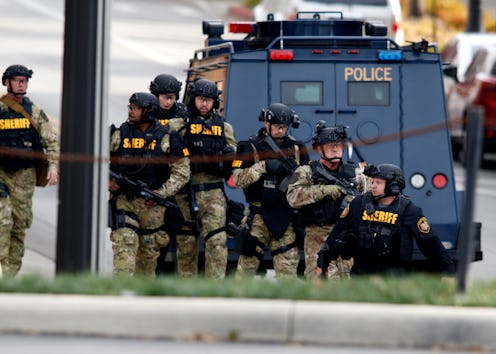News
Trump Supporters' Sad & Predictable OSU Response
Monday's attack at Ohio State University, wherein a man drove his car into a crowd of pedestrians and stabbed several people before being shot dead by police, has elicited an ugly yet sadly predictable response. The attacker in question reportedly came into the U.S. as a Somali refugee, and many saw this as vindication of Donald Trump's draconian anti-immigration policies. But it isn't, and to say that the OSU attack proves Trump was right is more than just factually incorrect, though it is that. It's also more than a little bit racist.
Shortly after the identity of the OSU attacker was reported, Trump supporters began boasting on Twitter that the terrorist attack validates Trump's support for "extreme vetting" of refugees and a ban on Muslim's entering the U.S. Many were quite gleeful in their boasting — which is inappropriate on its face, since a bunch of people just got stabbed — but in fact, the attack does nothing to vindicate Trump. Suggesting otherwise is problematic for a whole lot of reasons. Let's go down the list.
First, Trump supporters are committing the error of generalizing the whole from a single instance. One incident of a refugee committing a violent act does not mean, or even imply, that refugees are more likely than the general population to commit violent acts. Similarly, when a toddler accidentally shoots someone with a handgun (a rather common occurrence), this doesn't mean toddlers are inherently dangerous. The overwhelming majority of refugees and immigrants in America aren't terrorists, and haven't committed violent crimes. The case of the OSU attacker is an exception — one immigrant out of many millions — not part of a larger trend.
Overgeneralizing is bad enough on its own. But it's even worse in this instance, because the generalization is only being applied to certain groups — namely, foreigners, immigrants and Muslims. If you're going to argue that the OSU attack means Muslim immigrants are more dangerous than the general population, you'd also have to conclude from the Charleston massacre that white men, too, are at a higher risk of being violent than other groups.
Of course, Trump and his supporters aren't drawing that conclusion. They're only applying this standard to Muslim immigrants, which smacks of racism and bigotry. And it's all the more ironic given that the vast majority of mass shooters and serial killers are white males, and that right-wing extremists have committed twice as many terrorist attacks in the U.S. since Sept. 11 as Islamic extremists, according to data from New America.
The fact that Trump supporters are making basic errors in assessing the threat is only half of the equation, however. They're also giving Trump himself far more credit than he deserves. Trump has proposed "extreme vetting" in order to fight back the threat of immigrants-turned-terrorists — but crucially, he has never defined what he means by "extreme vetting." The words "extreme vetting" does not constitute a policy any more than "affordable health care" or "fiscal responsibility" is a policy. The devil is in the details, and Trump has provided none.
Lastly, even if Trump had explained his refugee vetting policy with more specificity, and even if there was reason to believe that it would be effective, we still don't know that he'd be able to implement it effectively as president. This is because he is not president yet.
So, by pointing to the OSU attack as evidence that "Trump was right," the president-elect's supporters are committing a logical fallacy, prejudicially targeting a specific group of people (many of whom happen to be non-white), crediting Trump for policies he has not yet provided, and assuming those policies would work without any evidence. That's four very basic errors in judgement, by my count, one of which has serious racist undertones.
The OSU attack was a tragedy. But it says precisely nothing about the overall threat level of refugees, and it says even less about Trump's ability to prevent further attacks.
